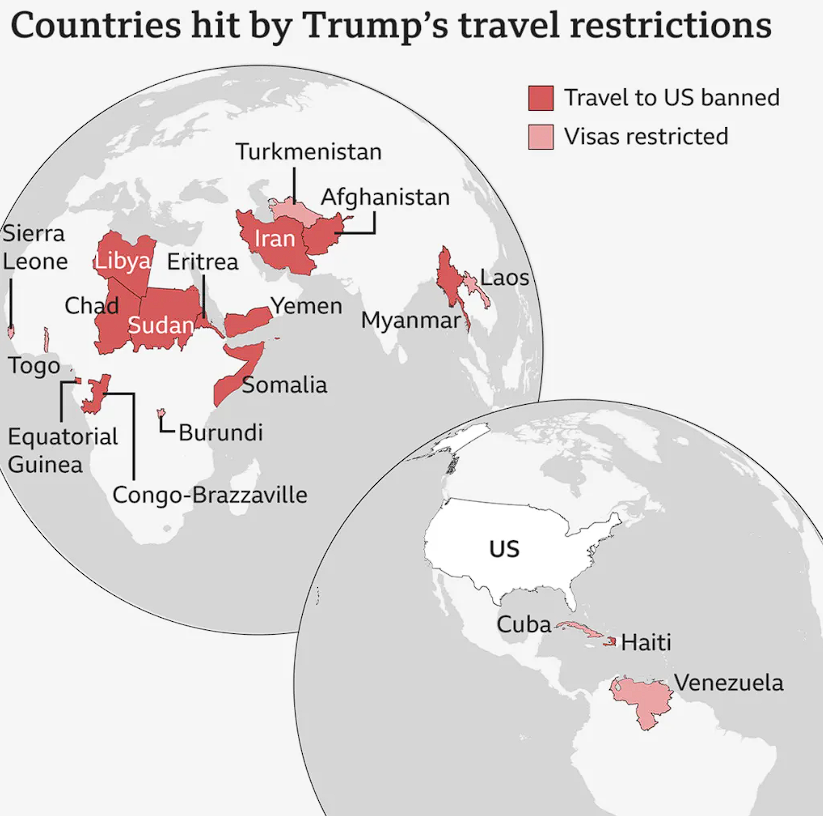Table of Contents
ToggleIntroduction:
In a move that’s sparked global attention, former U.S. President Donald Trump has signed a new proclamation in 2025 banning entry into the United States for citizens of 12 specific countries. Citing national security threats and inadequate cooperation from foreign governments, this executive order has reignited debate around immigration policy and public safety.
Let’s break down what this travel ban means, which countries are affected, and how it could impact global travel and diplomatic relations.
Which Countries Are Banned from Entering the U.S. in 2025?
As per the latest proclamation signed by Trump, nationals from the following 12 countries are now barred from entering the U.S.:
- Afghanistan
- Myanmar (Burma)
- Chad
- Republic of the Congo
- Equatorial Guinea
- Eritrea
- Haiti
- Iran
- Libya
- Somalia
- Sudan
- Yemen
These nations were identified due to high security risks, poor visa tracking systems, and limited cooperation with U.S. vetting agencies.

Why These Countries?
According to Trump and his policy advisors, the travel ban is a response to growing concerns about terrorism and public safety. A recent bombing in Boulder, Colorado—allegedly carried out by an Egyptian national who had overstayed his U.S. visa—was the tipping point for this proclamation. While Egypt is not on the ban list, the attack triggered a wider reassessment of foreign nationals overstaying visas or entering without proper background checks.
The countries on the list reportedly:
- Have weak identity verification systems
- Show limited cooperation with U.S. intelligence agencies
- Display high rates of visa overstays
- Pose elevated security concerns
Partial Restrictions on 7 More Countries
In addition to the full ban, seven more countries face partial restrictions, meaning travelers from these nations will see limited visa access and stricter scrutiny:
- Burundi
- Cuba
- Laos
- Sierra Leone
- Togo
- Turkmenistan
- Venezuela
This could include shorter visa durations, increased document verification, or in some cases, denial of specific visa types like work or tourism.
Who’s Exempt from the Travel Ban?
To avoid humanitarian backlash and allow for certain exceptions, the 2025 travel ban outlines exemptions, including:
- Green card holders (lawful permanent residents)
- Travelers with valid U.S. visas issued before June 9, 2025
- Athletes participating in global sports events like the Olympics or FIFA World Cup
- Individuals with approved U.S. waivers or deemed “in national interest”
These carve-outs are seen as a way to soften the impact while maintaining the security goal.
When Does the Travel Ban Take Effect?
The order was signed on June 4, 2025, and takes effect on June 9, 2025. Immigration officers and U.S. embassies worldwide have already been instructed to update their entry guidelines and visa processing standards in line with this new order.
Global Response to Trump’s 2025 Travel Ban
Reactions to the travel ban have been mixed:
- The African Union and several human rights organizations have called the policy discriminatory and harmful to international relations.
- Some countries, like Somalia, have pledged to cooperate and strengthen vetting protocols to get off the list.
- Venezuela and Iran, meanwhile, have strongly condemned the move, labeling it an “abuse of executive power.”
Opposition leaders in the U.S., including Congresswoman Pramila Jayapal, have criticized the decision, calling it “xenophobic” and damaging to America’s image abroad.
How Will This Affect U.S. Immigration and Foreign Relations?
From a policy perspective, this move may:
- Discourage legitimate travelers, students, and skilled workers from entering the U.S.
- Hurt diplomatic ties with key African and Middle Eastern nations
- Encourage legal challenges similar to Trump’s 2017 “Muslim Ban,” which was taken to the Supreme Court
- Strengthen Trump’s political base ahead of the upcoming elections, as it plays into his tough-on-immigration platform
What’s Different from the 2017 Travel Ban?
While the 2017 travel ban focused heavily on Muslim-majority countries, the 2025 version is broader, including African, Latin American, and Asian nations. Moreover, this time, Trump’s administration included athletic exemptions, likely in response to backlash from sports organizations and international athletes in the past.
Final Thoughts: What You Need to Know
Trump’s 2025 travel ban is not just a policy document—it’s a political statement. It reflects growing global tensions, shifting immigration trends, and an increasingly polarized world. Whether you agree or disagree, it’s essential to stay informed, especially if you or your loved ones are affected by international travel policies.
FAQ – 2025 Trump Travel Ban
Q1: Is this travel ban permanent?
No, the ban is subject to review and could be lifted if countries improve their cooperation and security systems.
Q2: Will students or workers from these countries be affected?
Yes, unless they already have valid visas or qualify under exemptions.
Q3: Can green card holders still enter?
Yes, green card holders are exempt from the ban.
Q4: Are these countries banned from all types of visas?
Mostly yes, but specific exemptions apply, such as athletic or humanitarian grounds.
Q5: Can the ban be challenged in court?
Yes, legal experts expect lawsuits similar to those seen after the 2017 travel ban.





